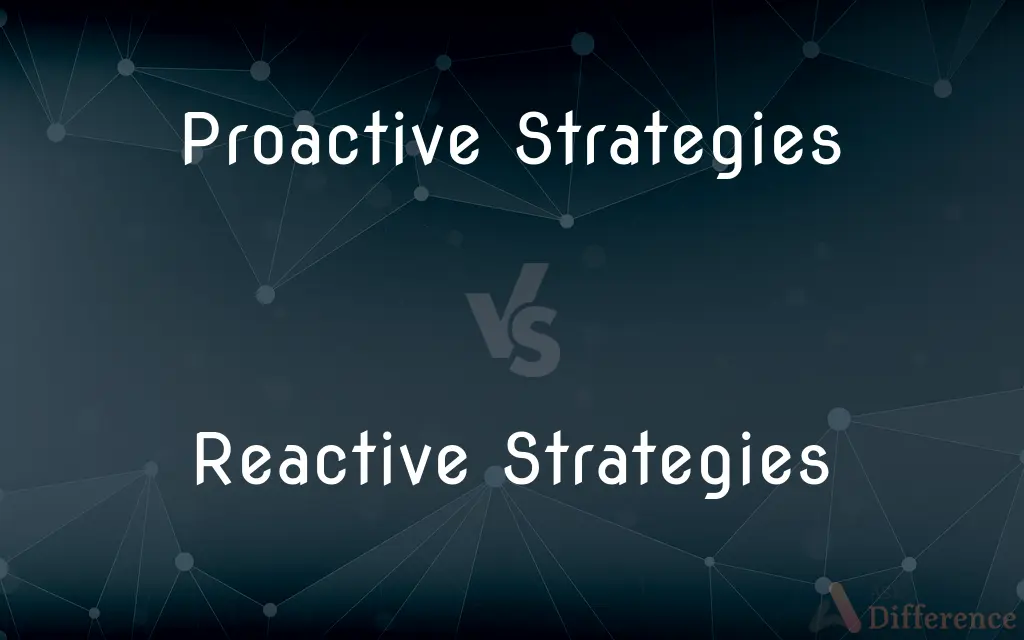Proactive Strategies vs. Reactive Strategies — What's the Difference?
By Tayyaba Rehman — Published on October 2, 2023
Proactive Strategies involve anticipating and addressing issues before they occur, while Reactive Strategies involve responding to situations as they arise.

Difference Between Proactive Strategies and Reactive Strategies
Table of Contents
ADVERTISEMENT
Key Differences
Proactive Strategies and Reactive Strategies are contrasting approaches in dealing with challenges and opportunities in various domains, such as business, personal development, or crisis management. Proactive Strategies involve anticipating potential problems, planning, and implementing solutions in advance. This approach is forward-thinking and often involves the creation of long-term plans and goals, focusing on prevention and preparation to mitigate risks and leverage opportunities, enabling entities to be in control of their actions and outcomes.
In contrast, Reactive Strategies are implemented in response to events or situations as they occur. This approach is often characterized by immediacy and adaptability, addressing issues post-occurrence. While Reactive Strategies can be efficient in managing unforeseen challenges and adapting to changing environments, they might lack the foresight and planned structure, potentially leading to suboptimal solutions and missed opportunities.
The distinction between Proactive and Reactive Strategies is pivotal. Proactive Strategies are typically associated with a strategic, organized approach, emphasizing foresight, anticipation, and preparation. They allow entities to navigate their paths effectively, minimizing negative impacts and maximizing benefits. In contrast, Reactive Strategies are often associated with flexibility and adaptability, responding to emerging needs and changes, which can be crucial in volatile and unpredictable environments.
Employing a balanced combination of Proactive and Reactive Strategies is often the most effective approach. Proactive Strategies facilitate stability and direction, aiding in the optimization of resources and efforts. Concurrently, Reactive Strategies provide the flexibility to adapt to unforeseen circumstances and evolving conditions, enabling quick adjustments and realignments, ensuring resilience and relevance in a dynamic context.
Comparison Chart
Definition
Involves anticipating and addressing issues before they occur.
Involves responding to situations and problems as they arise.
ADVERTISEMENT
Approach
Forward-thinking and strategic.
Immediate and adaptive.
Focus
Prevention and preparation.
Solution and adaptation post-occurrence.
Impact
Minimizes risks and leverages opportunities.
Manages unforeseen challenges and adapts to changes.
Effectiveness
Provides control and planned structure.
Offers flexibility and adaptability in volatile environments.
Compare with Definitions
Proactive Strategies
Proactive Strategies facilitate optimization of resources and efforts.
Proactive Strategies in resource management ensure optimal allocation and utilization, enhancing overall efficiency.
Reactive Strategies
Reactive Strategies involve adapting to changing environments and needs.
Reactive Strategies are essential in crisis management to navigate through unforeseen challenges effectively.
Proactive Strategies
Proactive Strategies involve planning and action taken in anticipation of future events.
Companies employing Proactive Strategies often invest in research and development to innovate and stay ahead in the market.
Reactive Strategies
Reactive Strategies can be efficient in managing unforeseen challenges.
The ability to implement effective Reactive Strategies is crucial for maintaining operational continuity during disruptions.
Proactive Strategies
Proactive Strategies are characterized by a forward-thinking approach.
Developing Proactive Strategies enables organizations to shape their future and navigate through uncertainties effectively.
Reactive Strategies
Reactive Strategies are responses formulated to address situations as they arise.
Companies often deploy Reactive Strategies to swiftly address and resolve customer complaints.
Proactive Strategies
Proactive Strategies aim at long-term benefits and sustainable solutions.
By embracing Proactive Strategies, companies can build a sustainable and resilient business model.
Reactive Strategies
Reactive Strategies are characterized by immediacy and flexibility.
In fast-paced markets, Reactive Strategies enable companies to quickly adjust to emerging trends and demands.
Proactive Strategies
Proactive Strategies focus on foreseeing and preventing potential problems.
The implementation of Proactive Strategies in risk management helps in identifying and mitigating risks early.
Reactive Strategies
Reactive Strategies focus on solving problems post-occurrence.
Reactive Strategies in conflict resolution involve addressing disputes and conflicts after they have occurred.
Common Curiosities
What is the main focus of Proactive Strategies?
Proactive Strategies focus on anticipation, planning, and prevention of potential problems before they occur.
Are Proactive Strategies forward-thinking?
Yes, Proactive Strategies are characterized by a forward-thinking and strategic approach to foresee and address future events and issues.
Do Proactive Strategies involve long-term planning?
Yes, Proactive Strategies typically involve the creation of long-term plans and goals focusing on sustainable solutions and benefits.
Do Reactive Strategies lack foresight and planned structure?
They might lack the foresight and planned structure, often focusing on addressing issues post-occurrence, which can lead to suboptimal solutions.
Can Reactive Strategies be beneficial in volatile environments?
Absolutely, Reactive Strategies offer flexibility and adaptability, allowing swift response and adjustment in volatile and unpredictable environments.
Is it effective to combine Proactive and Reactive Strategies?
Yes, employing a balanced combination of both can optimize stability, direction, flexibility, and adaptability, ensuring resilience and relevance.
How do Proactive Strategies impact resource optimization?
They facilitate the optimal allocation and utilization of resources and efforts by enabling planned and strategic approaches.
How do Reactive Strategies respond to situations?
Reactive Strategies involve addressing and adapting to situations and problems as they arise.
Can Proactive Strategies mitigate risks?
Yes, Proactive Strategies aim to identify and mitigate risks early by focusing on prevention and preparation.
Are Reactive Strategies characterized by immediacy?
Yes, Reactive Strategies are characterized by immediate responses to adapt and address situations as they occur.
How do Reactive Strategies enable companies to adjust to market demands?
They allow companies to quickly adjust their approaches, products, or services in response to emerging trends and demands in the market.
Do Proactive Strategies enhance overall efficiency?
Yes, by facilitating optimal resource management and strategic planning, Proactive Strategies can significantly enhance overall efficiency and effectiveness.
Can Reactive Strategies respond efficiently to customer complaints?
Yes, Reactive Strategies can be efficiently deployed to swiftly address and resolve emerging customer complaints and issues.
In what situations are Reactive Strategies essential?
They are essential in crisis management, fast-paced markets, and other situations requiring immediate adjustment and response to unforeseen challenges.
Can Proactive Strategies contribute to business resilience and sustainability?
Absolutely, by focusing on long-term benefits, risk mitigation, and strategic planning, Proactive Strategies can build a sustainable and resilient business model.
Share Your Discovery

Previous Comparison
Mall vs. Department Store
Next Comparison
Discount Allowed vs. Discount ReceivedAuthor Spotlight
Written by
Tayyaba RehmanTayyaba Rehman is a distinguished writer, currently serving as a primary contributor to askdifference.com. As a researcher in semantics and etymology, Tayyaba's passion for the complexity of languages and their distinctions has found a perfect home on the platform. Tayyaba delves into the intricacies of language, distinguishing between commonly confused words and phrases, thereby providing clarity for readers worldwide.
















































